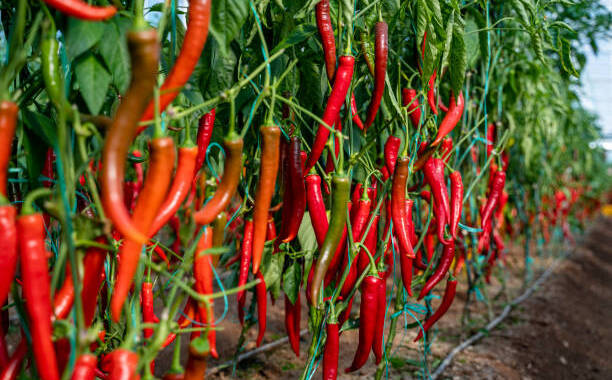
The ManicaPost

Tendai Gukutikwa
Post Reporter
The impact of Cyclone Idai, which ravaged some parts of Manicaland in 2019, is still being felt in many farming communities.
Among the most affected were small-scale farmers who depended on their crops for food and income.
The storm destroyed their fields, thereby leaving them with no means of sustenance.
However, according to chilli pepper farmers in Gudyanga, Chimanimani, the tragedy was a blessing in disguise as it came with the farming initiative that has transformed their lives for the better.
For the 39 Gudyanga Irrigation Scheme farmers, the initiative meant discarding subsistence maize farming and taking up income generating chilli pepper farming.
The initiative saw them completely changing their farming methods.
According to one of the farmers, Mr Sydney Pambuka, chilli pepper farming has transformed their lives as their produce has secured international markets.
“Chilli pepper farming has transformed our lives. We used to be at the mercy of development partners, with most of us affected by the donor syndrome. This is now a thing of the past as chilli peppers farming has given us the independence we needed. We are now able to look after our families,” he said.
The farmers now export their chilli peppers through a company called Chilli Pepper Company.
“When we started, we thought that it was a joke and that the project would collapse after a year or so, but that has not been the case. We have advanced our way of farming and our chilli is being exported to various countries.
“We have been contracted by an international company, Chilli Pepper Company. We provide them with the produce and they process it before exporting it worldwide.
“Our chilli is on shop shelves in Europe, United States of America, Asia and all over Africa,” said Mr Pambuka with a smile on his face.
He said while Cyclone Idai destroyed their key source of food, their economic security was restored and strengthened through the farming initiative.
“When the cyclone came, we thought we would never recover from it because most of our homes and infrastructure were destroyed. Our livestock was swept away by the floods.
“The loss had serious repercussions on our livelihoods. We struggled to maintain our irrigation systems due to financial constraints, but since the inception of chilli pepper farming, we have had no challenges in maintaining them,” he said.
The farmers ventured into chilli pepper farming in 2019.
Gudyanga Irrigation Scheme chairperson, Mr Tongai Chipiro said in the past they had tried to engage several companies for contract farming, but most of them regarded the area as high risk due to flooding which is usually experienced there.
“Our harvest and infrastructure were affected by the cyclone, so we looked around for companies to contract us and help us with farming inputs, but we had a difficult time.
“Food and Agriculture Organisation (FAO) came to our rescue. It assisted us with restoring our irrigation schemes and linked us with Chilli Pepper Company,” said Mr Chipiro.

Sydney Pambuka
When the farmers ventured into chilli pepper farming, each farmer had at least 0.1 hectare of their crop under the Chilli Pepper Company’s contract.
With time, the contracted farming land was increased to 0.2ha.
“By then,we were paid only 33 cents per kg, but prices have soared to 39 cents per kg,” he said.
To date, each of the 39 chilli farmers enjoy an income of close to US$200 per month.
“We produce the chilli then sell it to them. They grade it, crush it into a paste and export it to international markets,” explained Mr Pambuka.
He, however said despite the successful farming venture, they are still grappling with other challenges.
“Currently, our main challenge is with our irrigation scheme. Our pump sites are connected to solar, but the solar systems are not working as we expected.
“That is affecting our production and yields. When we are supposed to be producing at least a tonne during each harvest, we end up producing half a tonne,” he said.
Mr Pambuka said they aim to establish their own company that will add value to their produce.
“ln the long run we want to directly export our produce. We believe we are losing out by not adding value to our produce. We hope that one day we will have the adequate resources and linkages for us to grow our business,” he said.
Last week, Permanent Secretary in the Ministry of Lands, Agriculture, Water and Rural Resettlement, Dr John Basera applauded farmers who have managed to overcome the hurdles brought about by Cyclone Idai.




